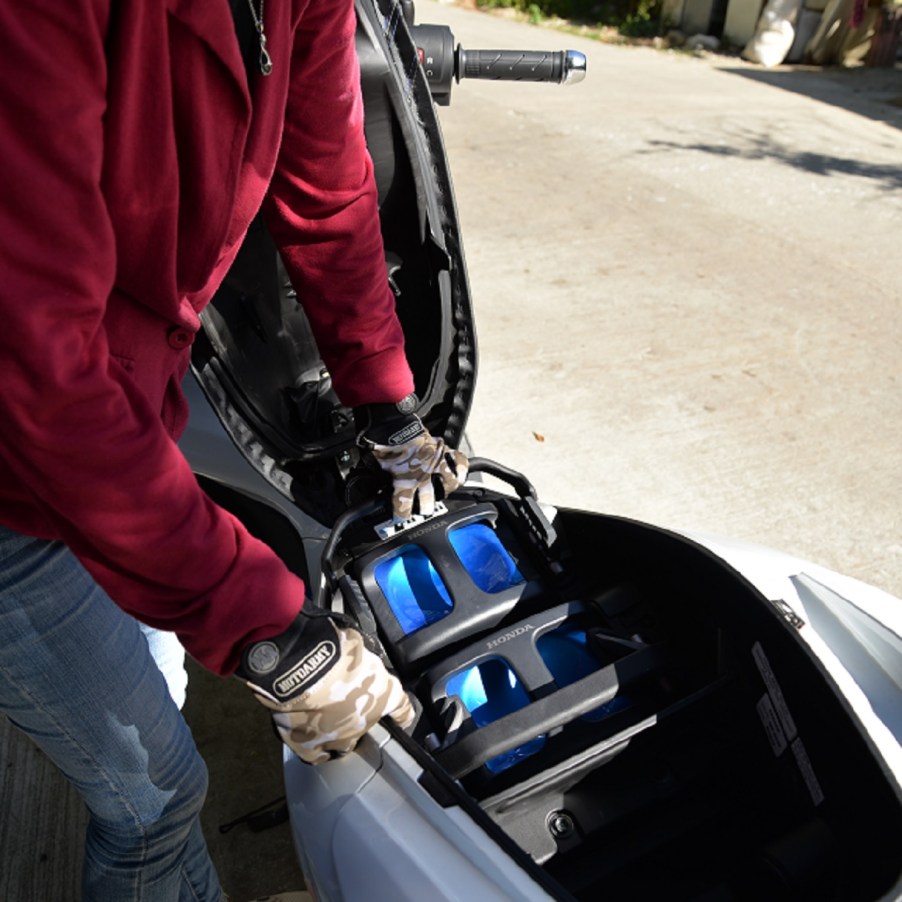
These Bike Companies Want Standardized Swappable Batteries
Cheaper batteries benefit all EVs, including electric bikes. However, charging infrastructure remains a major hurdle, especially for those who can’t install a home charger. Plus, some companies, such as Tesla, have proprietary standards, further complicating things. However, it appears that at least a few electric bike companies are trying to resolve these issues with a standardized, swappable battery design.
Yamaha, KTM, Piaggio, and Honda want their electric bikes to use one standard battery that you can swap
Yamaha, KTM, Honda, and Piaggio are some of the world’s biggest motorcycle companies, Cycle World reports. And recently, the four of them announced their desire to collaborate on a standardized, swappable electric bike battery. Specifically, one that could also be used in each firm’s other non-car light vehicles, Rider reports, including mopeds and quads/ATVs. In essence, think of it as like establishing the AA/AAA/D battery standards, but for bikes, Bennetts explains.
This consortium may seem odd to US customers, seeing as neither Yamaha nor Honda sells electric motorcycles here. KTM, though, does offer several electric dirt bikes. And Piaggio has an electric Vespa scooter. However, Honda recently filed patents for what appears to be an electrified CB300R, Cycle World reports. Plus, Yamaha is reportedly working on an electric motocross bike, VisorDown reports. In short, these companies have plenty of motivation to develop electric bike batteries.

Also, working together on a standardized electric bike battery that users can freely swap makes a lot of sense, Jalopnik explains. For one, it lowers development costs, thus making the bikes/ATVs/mopeds cheaper. Plus, an open standard theoretically encourages EVs and charging stations to be more widespread, RideApart reports. And this consortium is open to other manufacturers, Reuters reports, further increasing industry involvement, development speed, and, ultimately, EV adoption.
However, it’s worth pointing out that Yamaha, KTM, Honda, and Piaggio aren’t the first companies to pursue battery swaps. Or even standardized EV technology, for that matter.
The push for standardized charging and battery swaps continues beyond electric bikes
The idea of EV battery swaps has been around for some time, Roadshow reports. Specifically, before fast-charging and 300-plus-mile ranges were possible. And on paper, the idea is sound, RevZilla points out.

Instead of waiting around for an extended period of time, you just pop out your drained battery and slot in a fully-charged one. That’s why Tesla pursued it for years before seemingly abandoning it, Jalopnik reports. And it’s been implemented outside of the US, Autoblog reports.
Kymco and Gogoro have battery swap stations for their respective electric bikes in Japan and Taiwan, respectively. Plus, electric carmaker Nio offers it in China, Car and Driver reports.
As for charging standards, some automakers have been calling for a singular standard for years, Car and Driver reports. And as a whole, the industry is trimming down. Currently, besides Tesla’s proprietary system, the US mainly uses CHAdeMO and CCS, Car and Driver reports. But Nissan, one of the two CHAdeMO proponents, has started transitioning towards CCS, Roadshow reports. Unfortunately, while there are CCS-to-CHAdeMO adapters, there aren’t any CHAdeMO-to-CCS adapters, The Drive reports.
How soon could these technologies reach consumers?
However, a singular charging standard is different than a standard battery design. And considering that electric car batteries still have some material issues to work out, an industry-standard layout may take some time.
So, what about the standard, swappable electric bike battery from Honda, Yamaha, KTM, and Piaggio? The consortium intends to start working on the initial design in May of this year, MCN reports. If all goes well, testing could begin shortly thereafter, and a finalized battery could theoretically be ready in about a year. But, as Cycle World points out, it took “decades” for the AA, AAA, and D designations to become industry standards.

Still, if it means electric bikes become more affordable and easier to live with, here’s hoping this collaboration is a success.
Follow more updates from MotorBiscuit on our Facebook page.


